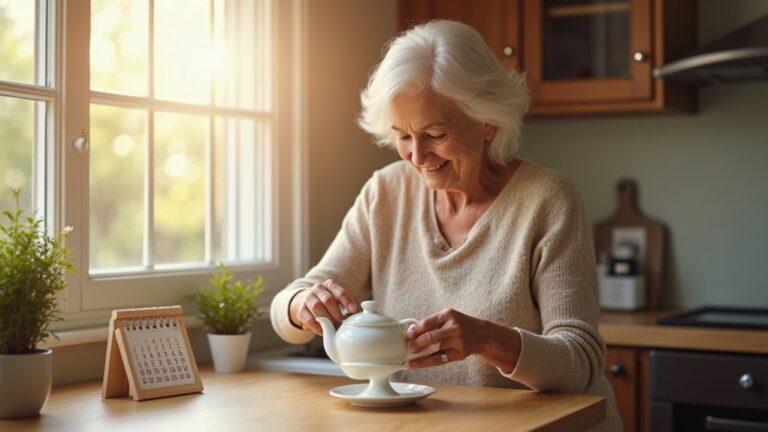Scent and Memory: How Aromatherapy Supports Dementia Care
Have you ever noticed how a familiar scent can whisk you back to a cherished moment? In dementia care, aromatherapy taps into this powerful link between scent and memory, offering you comfort and connection. By using essential oils like lavender or rosemary, you can ease anxiety, spark joy, and evoke calming past experiences. It’s a gentle way to support emotional well-being. Stick around to uncover more ways this therapy transforms lives.
Key Takeaways
- Aromatherapy uses familiar scents to evoke comforting memories for individuals with dementia.
- Scents like lavender and chamomile reduce anxiety and promote emotional well-being.
- The olfactory bulb links smells to memory, triggering vivid recollections in dementia care.
- Essential oils such as rosemary and peppermint support cognitive clarity and focus.
- A soothing environment with diffused oils enhances comfort and connection for dementia patients.
The Science Behind Scent and Memory
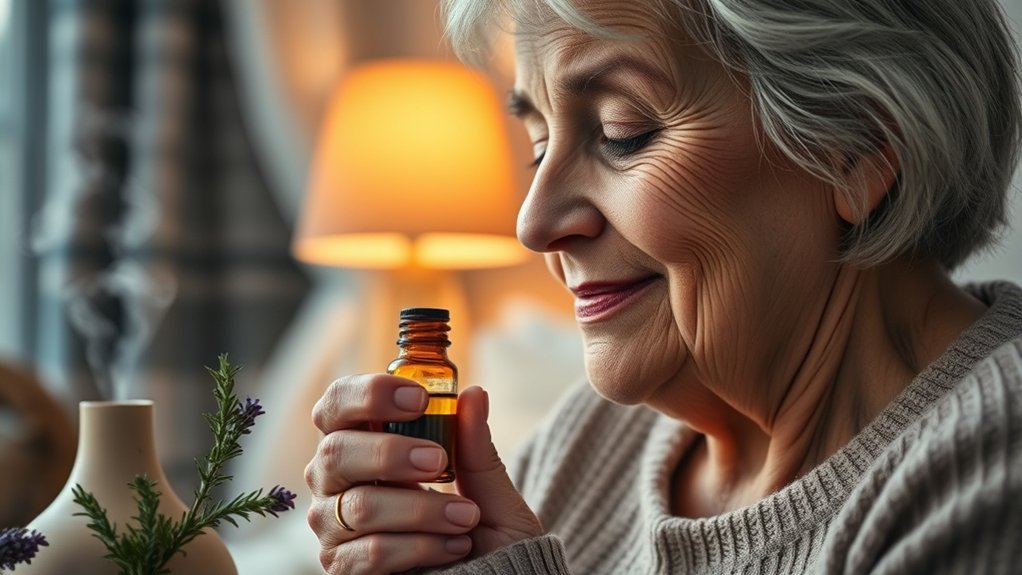
Curiosity often leads us to wonder how a simple whiff of lavender can transport you back to your grandmother’s garden. You’ve likely noticed how certain smells trigger vivid memories, and there’s a powerful reason for this.
Your brain’s olfactory bulb, which processes scents, connects directly to the amygdala and hippocampus—areas tied to emotion and memory. When you inhale a familiar fragrance, it sparks instant recall, often more potently than sights or sounds.
As someone keen to serve others, you can harness this science to comfort those in need. By introducing familiar scents, you’re not just stimulating senses; you’re revealing cherished moments. In settings like compassionate assisted living, the use of scent can enhance the well-being and connection among residents.
Use this gift of scent to bring warmth and connection to those you support every day.
Understanding Aromatherapy in Dementia Care
Building on the link between scent and memory, let’s explore how aromatherapy can play a meaningful role in dementia care.
As someone dedicated to helping others, you can use this gentle practice to support those living with dementia. Aromatherapy involves using essential oils—natural plant extracts—to stimulate the senses through inhalation or skin application.
You’ll find that familiar scents can evoke past memories, offering comfort to individuals who may struggle with recall. Additionally, incorporating music from the resident’s formative decades can further enhance emotional responses and promote positive memories.
Benefits of Aromatherapy for Emotional Well-Being
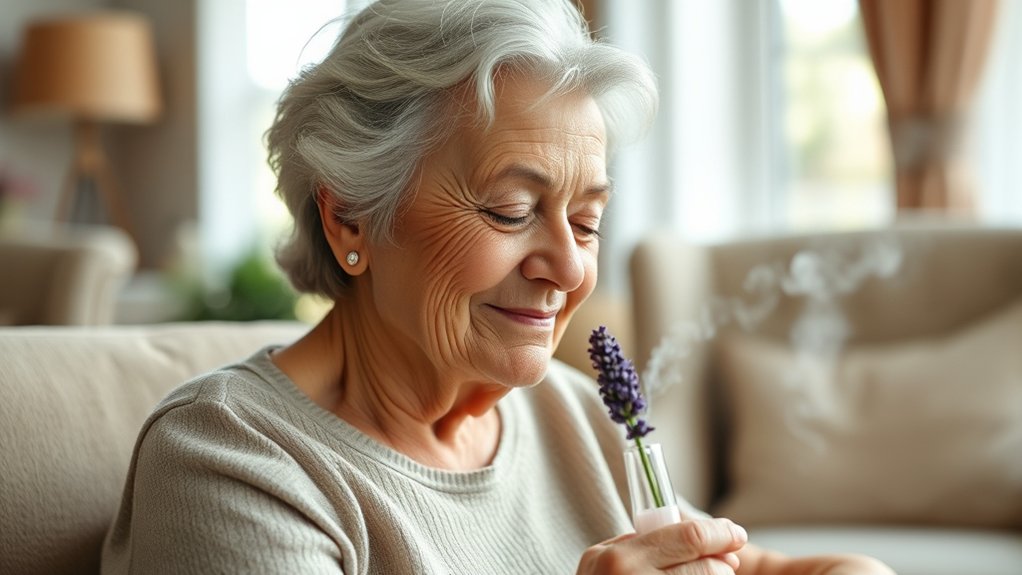
As you explore aromatherapy in dementia care, you’ll notice its profound impact on emotional well-being. Scents can evoke comforting memories, helping those with dementia feel calmer and more connected.
When you introduce soothing aromas, you’re offering a gentle way to ease anxiety and lift moods, creating a nurturing environment.
Imagine seeing a loved one smile as a familiar fragrance sparks joy or reduces agitation. By using aromatherapy, you’re not just providing care; you’re fostering emotional security and peace. Celebrating milestones through personalized birthday celebrations can further enhance these positive experiences, making them even more meaningful.
It’s a simple yet powerful tool to support their heart and spirit. As you serve others, remember that these sensory experiences can build trust and comfort, making each day brighter for someone navigating through the challenges of dementia.
Key Essential Oils for Cognitive Support
While exploring aromatherapy for dementia care, you’ll find that certain essential oils stand out for supporting cognitive function.
As someone dedicated to helping others, you can use these oils to enhance memory and focus for those with dementia. Rosemary essential oil, for instance, boosts mental clarity and recall, making it a powerful tool in your care toolkit.
Peppermint oil energizes the mind, helping to combat mental fatigue. Lemon oil also sharpens concentration, offering a revitalizing way to stimulate thought processes. Additionally, volunteering in retirement can provide a sense of accomplishment that complements the cognitive benefits of aromatherapy.
Incorporate these oils into diffusers or gentle massages to create a supportive environment. By doing so, you’re not just aiding cognition but also showing compassion through thoughtful, sensory care that truly makes a difference in their daily lives.
Reducing Anxiety Through Calming Scents
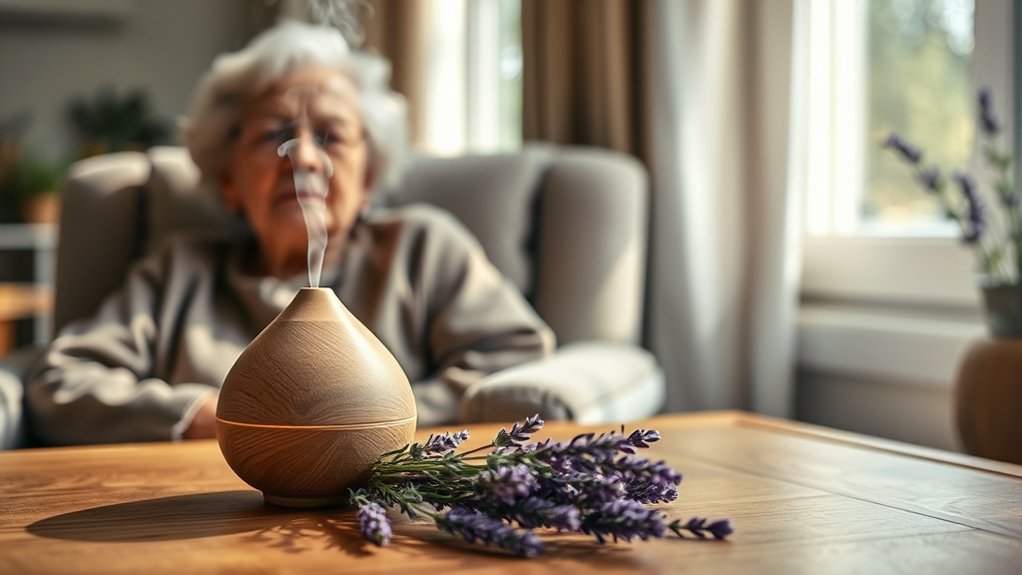
When you’re caring for someone with dementia, you’ll notice that anxiety often disrupts their peace. As a caregiver, you can help by introducing calming scents through aromatherapy.
Lavender, with its soothing properties, can ease their restlessness when diffused in their space. You’ll find that just a few drops in a diffuser create a serene environment, helping to lower their stress levels.
Try incorporating chamomile as well; its gentle aroma can comfort them during tense moments. Place a sachet near their favorite chair or use a diluted oil for a light massage on their hands. Additionally, consider how engaging activities can complement the calming effects of aromatherapy by providing mental stimulation and social interaction.
Enhancing Sleep Quality With Aromas
If you’re caring for someone with dementia, you’ll notice sleep disturbances can be a frequent challenge. Restless nights often disrupt their well-being and yours, making patience and creativity essential.
Caring for someone with dementia often means facing sleep challenges. Restless nights affect both of you, demanding patience and creative solutions.
Aromatherapy offers a gentle way to help. Scents like lavender and chamomile have calming properties that can ease the mind, promoting relaxation before bedtime.
You can transform their environment into a soothing haven by introducing these aromas. Imagine the comfort you’ll bring as they drift into a peaceful slumber, their tension melting away.
Research shows these scents may reduce nighttime agitation, helping regulate sleep patterns. By incorporating calming fragrances, you’re not just aiding rest—you’re nurturing their dignity and comfort, a true act of care and compassion. Additionally, spending time outdoors in a relaxing and peaceful setting can further enhance their overall well-being and improve sleep quality.
Practical Ways to Use Aromatherapy Safely
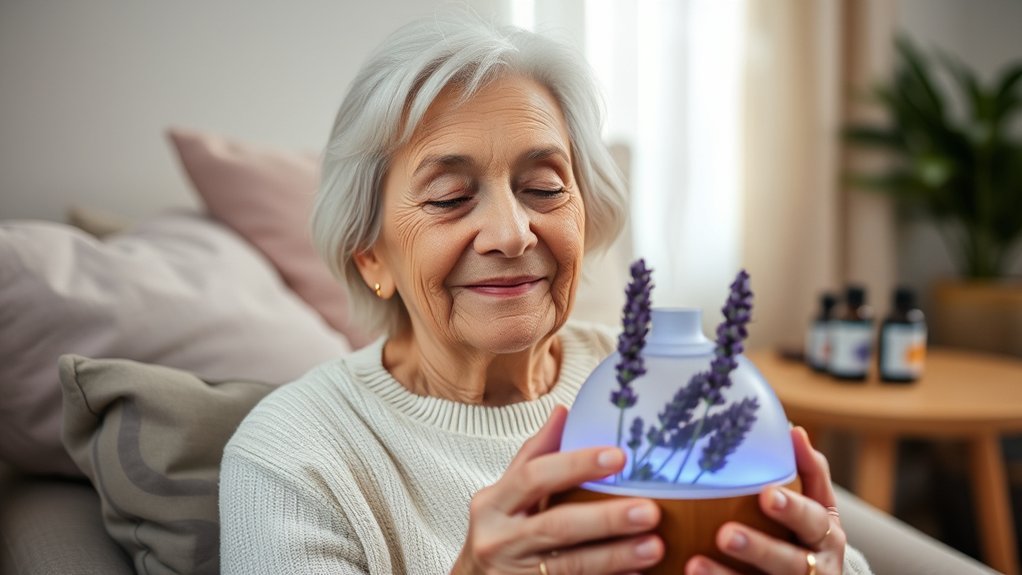
As you explore aromatherapy for dementia care, prioritize safety to confirm its benefits shine through.
Start by choosing high-quality, pure essential oils from trusted sources to avoid harmful additives. Always dilute oils with a carrier oil before applying to skin to prevent irritation, and test a small area first.
Use diffusers in well-ventilated spaces to avoid overwhelming the person you’re caring for, and limit sessions to 30 minutes.
Store oils securely, out of reach, as they can be toxic if ingested. Consult healthcare professionals before starting, especially if there are existing medical conditions or medications.
Finally, observe reactions closely—if you notice discomfort, stop immediately. Your careful approach confirms aromatherapy remains a nurturing, supportive tool for those you serve. Additionally, fostering strong connections through regular communication can enhance emotional strength for individuals with dementia.
Stories of Impact in Dementia Settings
While exploring aromatherapy’s role in dementia care, you’ll find powerful stories that highlight its impact.
Imagine walking into a care home and seeing a resident, once withdrawn, light up as the scent of lavender fills the air. You witness her recalling a garden from her past, a smile breaking through her usual silence.
In another setting, you notice a gentleman with agitation calming down as the aroma of chamomile surrounds him, easing his distress.
These moments show how scents reconnect individuals to cherished memories, offering comfort and peace. Additionally, intergenerational programs can enhance the experience, creating opportunities for residents to share their stories and emotions through sensory engagement.
As someone dedicated to serving others, you can’t help but feel inspired by these transformations, knowing that simple aromas can reveal emotions and foster connection in those living with dementia.
Tips for Caregivers Using Scent Therapy

When introducing scent therapy in dementia care, start by selecting essential oils known for their calming effects, like lavender or chamomile. You’re helping loved ones find comfort, so test scents in small doses to guarantee they don’t trigger distress. Observe their reactions closely—every person’s response is unique.
Next, create a soothing environment by diffusing oils in a quiet space. Don’t overwhelm them; a few drops go a long way. Incorporate familiar scents if possible, as they can evoke positive memories.
Always prioritize safety—keep oils out of reach and avoid direct skin contact unless diluted. Additionally, consider the benefits of a supportive environment that prioritizes emotional well-being to enhance the effectiveness of scent therapy. Finally, be patient. You’re offering a gentle way to connect, and even small improvements in mood or relaxation can make a big difference in their day.
Frequently Asked Questions
Can Aromatherapy Reverse Dementia Symptoms?
Hey, you’re wondering if aromatherapy can reverse dementia symptoms, right?
While it can’t cure or reverse the condition, you can still make a difference. Use aromatherapy to ease anxiety, improve mood, and trigger comforting memories for those you care for.
Choose calming scents like lavender to create a soothing environment.
You’re not fixing dementia, but you’re offering peace and connection, which means the world to them.
How Much Does Aromatherapy Treatment Cost?
Wondering how much aromatherapy treatment costs? You’re likely keen to help someone in need, and I’m glad you’re exploring this option.
Costs can vary widely, ranging from $30 to $100 per session, depending on the therapist’s expertise and location.
You can also buy essential oils for $5 to $20 to use at home.
Check local wellness centers or online resources to find affordable options that’ll support your caring efforts.
Are There Risks With Long-Term Use?
Hey, you might be wondering if there are risks with long-term use of certain therapies. It’s a valid concern when you’re dedicated to helping others.
Prolonged exposure can sometimes lead to skin irritation or allergic reactions, so you’ve gotta monitor those you care for closely.
Always consult professionals to guarantee safety, and don’t hesitate to adjust approaches if you notice any adverse effects.
Your vigilance truly matters!
Can Aromatherapy Replace Dementia Medications?
Hey, you’re wondering if aromatherapy can replace dementia medications. Let’s explore.
While aromatherapy offers comfort and emotional support, it can’t take the place of prescribed treatments. Use it as a complementary tool to ease stress or boost mood, but don’t skip the meds your loved one needs.
Always check with their doctor to confirm you’re blending care approaches safely, keeping their well-being at the heart of every decision.
Where Can I Buy Quality Essential Oils?
Hey, looking for quality essential oils? You’re in the right mindset to help others with your search!
Check out trusted online retailers like doTERRA or Young Living for pure, therapeutic-grade oils. You can also visit local health stores or farmers’ markets for artisanal options.
Don’t forget to read reviews and guarantee third-party testing for purity. Your dedication to finding the best will truly make a difference for those you serve!


